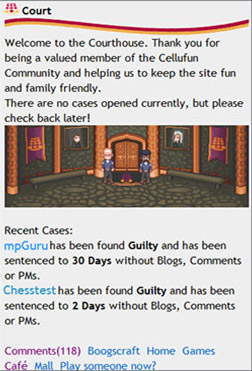Cellufun brings democratic justice to online community
Virtual frontier justice and court system for five million citizens

Cellufun's five million strong membership at its mobile games community and portal is attempting to stem acts of virtual anti-social behaviour, bullying and inappropriate content by installing an online law enforcement and punishment system.
As novel as all this sounds, the boundaries between virtual crime and actual, prosecuted offences are becoming increasingly blurred. Committing a crime online really isn't that difficult, but this realm of cyberspace misdemeanour still goes beyond piracy and porn. Astute lawyers have been very active, forging themselves a net-based clientele, and there are increasing numbers of virtual offences making their way into real life criminal courts.
"When you've got a community as big as ours, there's a need to uphold a mutually agreeable value system," says Stephen Dacek, COO and State Governer of Cellufun. "With our new justice system, our community now has a self-ruling mechanism that can grow and evolve at its own pace."
Cellufun is simply taking an online code of conduct system one step further by attempting to introduce a quantifiable, acceptable behaviour ethic – backed up by a virtual enforcement system as a deterrent. With the new system, users can flag posts, blog entries or other user communication as inappropriate.
If a user is indicted by enough community members for inappropriate behaviour or other misdeeds, they're processed by the newly instated justice system. Once indicted, experienced players (now referred to as citizens) are chosen at random to sit on a jury. The jury is presented the questionable material as evidence, and at the same time the accused can defend themselves on their profile page.
The jurors then cast anonymous votes for to determine guilt before also voting on a sentence. If found guilty, the player is barred from communicating with the community (though the citizen can still play games – as in the real world, law comes after profit) for a period of time determined by the jurors and by prior convictions. Once sentenced, the player's avatar is also shown behind bars and in prison garb.
"The Courthouse and Jail add a new element to our virtual world," adds Cary Torkelson, VP of research and newly appointed Mayer at Cellufun. "This system serves to engage the community on a whole new level. It serves a vital purpose in keeping Cellufun a fun, vibrant, and safe place to play games with friends."
What's particularly interesting, from a socio-biological standpoint, is the shape virtual communities are now taking. These collections of digitised people, from all over the world, are becoming reminiscent of frontier settlers; reaching significant enough levels of population that self-government becomes an increasing necessity. But these gradually establishing laws transcend physical boundaries; a 'citizen' might be able to literally flee a country to avoid persecution or prosecution, but there's no running away from an intangible, but still very real, cybernetic existence.
I'd like to nominate William Gibson as the internet's first sheriff. That should bring some order to this lawless land, y'all.
